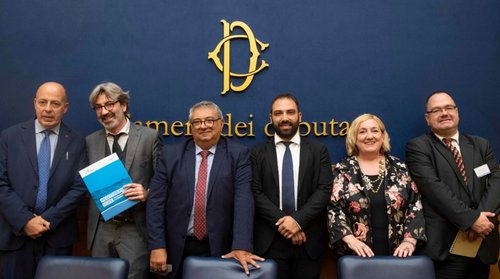European Humanitarian Corridors
2019. október 18., péntekItalian humanitarian corridors set the precedent for Europe. Representatives of the Protestant church from 15 EU countries, including RCH’s refugee integration ministry, discussed this example of good practice in Rome.
At the conclusion of a two days consultation on October 8 and 9, there was a press conference at the Camera dei Deputati with Vice Minister for Foreign Affairs and Co-operation, Emanuela Del Re and president of the Commission for Constitutional Affairs for the Chamber, Giuseppe Brescia.
Paolo Naso, coordinator of Mediterranean Hope, has become an example for Europe. Backed by the force of European Protestant churches, today we seek to bring this practice into the EU. The FCEI’s objective is to open a legal access channel, namely, a humanitarian corridor at the European level, shared by more member states to transfer 50,000 vulnerable people from around Libya.
Also present at the meeting with the press was Torsten Moritz, Secretary General of the Churches’ Commission for Migrants in Europe (CCME), who confirmed the commitment of this umbrella organization, which brings together bodies concerned with migrants from various European Anglican, Protestant and Orthodox churches and associations.
“Open up European Humanitarian Corridors” which, based on the experiment implemented in Italy from 2015, will provide a secure and legal access route into Europe for tens of thousands of refugees trapped in and around Libya: this is the proposal and request which the Protestant churches of Europe put to the Italian government, European partners, and EU institutions at the International Conference.

At the meeting called by the Federation of Protestant Churches in Italy which manages the organization Mediterranean Hope, there were representatives from 15 countries belonging to 25 European and international churches and ecumenical organizations. “It has been an exceptional opportunity to meet and has made clear the extent to which European churches are committed to innumerable projects supporting policies for reception and migrants’ human rights,” commented Rev Luca M. Negro, FCEI president. “It has launched a policy proposal which is sustainable and proven to work, namely, that of Humanitarian Corridors, albeit on a European scale. As is natural,” added Nero, ”Italy is among the EU countries which are most exposed to migratory flows and it is fair and understandable, also at a political level, for it to assume leadership in seeking solutions which guarantee security and sustainability as well as the upholding of human rights”.
Balázs Acsai, CEO of the Kalunba Social-Services, implementing partner of RCH in terms of refugee integration, was present at the meeting. The Reformed Church in Hungary has been working with refugees and supporting refugee integration since 2006. Due to the withdrawal of grants from the Asylum Migration Integration Fund (AMIF) in 2018, Kalunba was forced to take a step back. However, thanks to the financial and moral support of international church partners of RCH, many of them present in Rome, Kalunba Social Services Ltd. has been able to continue to provide integration services to recognized refugees and migrants. The consultation provided opportunities for Acsai to strategize cooperation and update partners on the Hungarian situation.
“We have taken the opportunity at this conference,” added Paolo Naso, coordinator of MH, “to directly address political institutions, presenting the outline of a proposal which has been defined in general terms but whose technical aspects have yet to be finalized. In that connection, the meetings with Vice-minister Emanuela Del Re, who has always been attentive to this topic, have been of huge importance because they have allowed us to consider the merits of certain technical questions,” continued Naso, and that enables us to strengthen our proposal. In the same way we have gladly noted the support expressed by the presidents of the Commissions for Constitutional and EU Political Affairs for the Camera dei Deputati, the Hon. Giuseppe Brescia and Sergio Battelli. The next stage will be December 10th in Brussels,” concluded Naso, “to present the definitive technical proposal, which has also benefited from comments and consideration by the United Nations High Commissioner for Refugees (UNHCR), to the Presidents of the European Parliament and Commission.
Ecumenical Office
Via www.nev.it
Contact us
Click here if you are interested in twinning.
Reformed Church in Hungary
Address: H-1146 Budapest, Abonyi utca 21.
PO Box: 1140 Budapest 70, Pf. 5
Email: oikumene@reformatus.hu
English, German and Korean language services in Budapest
Links
Recommended articles
-
Pastoral Letter in the Light of the Pandemic
Bishop Dr. István Szabó sent a pastoral letter of encouragement to the ministers serving in RCH’s congregations, expressing his gratitude for the persistence and creativity of the pastors.
-
RCH Joins in Pope's Call for Prayer
RCH published the call on congregations to join the initiative of Pope Francis, supported by ecumenical organisations, to unite in praying the Lord’s Prayer on Wednesday, 25 March, at noon.
-
English Speaking Worship Services Online
Each Sunday at 11 AM (CET) the St. Columba's Church of Scotland in Budapest, the international community of RCH invites you to join the worpship service on its facebook page.
-
Test of Humanity and Companionship
Reformatus.hu asked Dr. György Velkey, Director General of the Bethesda Children’s Hospital of RCH about the challenges of health care workers and ways of prevention against the pandemic.
-
All Church Events Suspended
In light of the coronavirus the Presidium of RCH requested congregations to suspend all church events with immediate effect. Beside restrictions, it calls for prayer, sobriety and responsibility.











